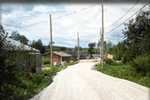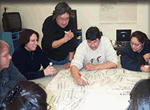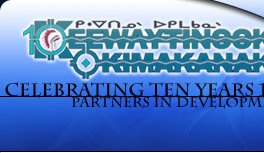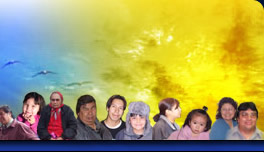|
|
| |
| The
Finance Team
provides assistance and advice
to the First Nations as well
as accounting support for Keewaytinook
Okimakanak.The advisor and other
members of the team are available
to provide financial advice
and assistance to the First
Nations in the following areas:
|
| |
- Nuviews
and Accpac computerized
accounting systems
- Accounting
filing systems
- Government
programs, reporting, and
methods
- Financial
policies and management
systems
- Payroll
- Employee
Pension plans
- Contribution
agreements, etc.
|
|
|
| |
 |
| Much
of the Health Program's
work involves supporting
community efforts to access
funding for local health
promotion initiatives. |
Keewaytinook
Okimankanak's health
(http://health.knet.ca)services
department is funded
through the Medical Services
Branch, Health Canada, the Ministry
of Health and other health-related
programs. We incorporate the
Primary Health Care Model in
our approach, which means: involvement
of the community in health care
decisions, focus on disease
prevention and promotion, and
use of an interdisciplinary
approach in planning and implementing
appropriate solutions to health
problems. Staff work closely
with front-line community health
workers providing advisory and
support services in a variety
of ways, which include: |
| |
- Health
program planning and program
development- includes
Brighter Futures/Building
Healthy Communities, NAN
Crisis Team grants, Aboriginal
Healing and Wellness Strategy-justice
and family violence, community
and training grants
- Reporting
- Brighter Futures/Building
Healthy Communities interim
and final activity and financial
reports, Aboriginal Healing
and Wellness evaluations
and financial reports for
Community and Training Grants
- Proposals
and Needs Assessments
- Aboriginal Healing and
Wellness Community and Training
grants applications, NAN
Crisis Team grant applications,
Long Term Care needs assessments
and proposals, Brighter
Futures/Building Healthy
Communities needs assessments;
and other proposals as requested
- Advocacy
- assist in speaking on
behalf of communities and
members in accessing health
services
- Coordination
- working with communities
to share resources and information
for effective health program
delivery and efficient use
of resources
- Liaison
- representing communities
on boards and committees
-
Community Worker Support
- on-going on a daily basis
- Training
- workshops for Coordinators,
Mental Health Workers at
least two times yearly
- Advisory
- make recommendations to
communities about services
|
|
|
| |
 |
| The
construction of roads
like this one in Poplar
Hill is facilitated by
the technical services
of KO Public Works. |
The
Public Works Unit provides
advisory and technical services
to KO First Nation Communities
in the areas of:
- Technical
Training & Development
- Community
& Capital Planning
- Policy
& Housing Inspection
- Operation
& Maintenance
- Project
Management
- Minor
Capital Projects
- Major
Capital Projects
- Other
Capital Projects
- This
Support includes:
- Working
with the First Nations to
develop capital data bases
and monitoring systems to
track progress of community
proposals
- Assisting
First Nations to gain access
to skills and expertise
for maintenance programs
- Advising
on technical procedures
and on project management
- Advising
on codes, standards, and
retaining technical expertise
and consultants
|
|
|
| |
| The
Economic Development
team provides assistance to
First Nations and individual
band members from Keewaytinook
Okimakanak in areas of business,
training and proposal development
to enhance self-sufficiency.
Current goals for the program
are: |
| |
- Economic
and Resource Development
- Locate
avenues of funding for
business development
and services enhancement
for First Nations
- Develop
long term economic/resource
development strategies
- Assist
First Nations with coordination,
planning and development
of projects, as required
- Participate
in research, planning
and development of land
use strategies
- Small
Business Planning
- Respond
to enquires from individuals
and KO First Nations
- Review
and assist member First
Nations with funding
proposals
- Training
- Develop
and coordinate training
programs for economic
development worker
-
Host/conduct workshops
and information sharing
sessions on issues of
common concern in Economic
Development
|
|
|
| |
| Keewaytinook
Okimakanak Education
provides advisory services and
assistance to member First Nations
in a variety of ways which include:
|
| |
- program
review
- education
workshops
- curriculum
development
- staff
training and support
- principal
training and evaluation
- education
director/education authority
training and support
- participation
on district-wide and regional
education committees and
initiatives
|
| Keewaytinook
Internet High School
(KiHS)
was created for Aboriginal youth
who live in small isolated First
Nation communities in Northwestern
Ontario. KiHS is the first Ontario
school to offer accredited secondary
school courses using the Internet
as a mode of program delivery.
With its traditional face-to-face
classroom setting meshed with
internet course delivery, KiHS
capitalizes on the ability to
share resources and personnel,
and thereby maximize potential
course offerings.
KiHS
begins its third year of operation
in September 2002, offering
a full grade 9 and 10 program
online. Service has expanded
beyond KO member communities
to meet the needs of 13 First
Nations throughout the north.
These are: Cat Lake, Deer
Lake, Eabametoong, Frenchman's
Head, Fort Severn, Fort William,
Keewaywin, Kejick Bay, North
Spirit Lake, Sachigo Lake,
Slate Falls, Weagamow, and
Webequie.
|
| |
|
|
| |
|
The staff of
K-Net develop and maintain the
K-Net Network which is a
regional broadband network linking
First Nations and their service
organizations using a variety
of Information Communication
Technologies including video
conferencing, IP telephony,
on-line forums, e-mail, and
other web-based communication
tools. Other services which
K-Net provides are: |
| |
- Computer
maintenance and support
for Keewaytinook Okimakanak
and member First Nations
- Operating
and managing a small computer
business
- a
regional hardware and software
helpdesk service for Industry
Canada First Nations Schoolnet
- Developing
and facilitating computer
training programs
|
|
|
| |
 |
| KO
staffers Francine McKenzie
and Les Meekis facilitate
an ICT Planning Workshop
in Fort Severn in January
2002. |
The
Kuh-ke-nah Network of SMART
First Nations (http://smart.knet.ca)
is a three-year initiative
begun by Keewaytinook Okimakanak
and our partners in 2001.
KO was one of twelve projects
chosen in Canada by Industry
Canada to demonstrate community
development in an Aboriginal
context utilizing a variety
of Information Communication
Technologies (ICTs) and applications.
Other partners include FedNor,
SLAAMB, HRDC, the Northern
Ontario Heritage Fund, Bell
Canada and NAN First Nations
and Tribal Councils.
SMART
services are being deployed
to overcome barriers of distance
and isolation, to improve
community well-being, enhance
learning opportunities, and
support skills and knowledge
acquisition. Smart applications
being developed include:
|
| |
- Public
Access sites (e-Centres)
in district First Nations
- Regional
on-line training programs
for local Computer Technicians
- Keewaytinook
Internet High School (KiHS)
-
KOHS-NORTH (Telehealth)
Network
- Data
Warehouse Applications (administrative
tools, digital photo collections,
on-line news, GIS, etc)
- Portal
Development and maintenance
- e-Business
opportunities including
the Caching Router initiative
and IP telephony
|


